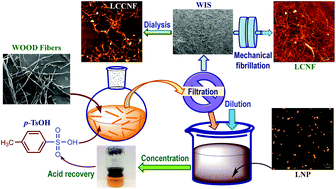Producing wood-based nanomaterials by rapid fractionation of wood at 80 °C using a recyclable acid hydrotrope†
Abstract
Here we report the unparalleled performance of a novel acid hydrotrope, p-toluenesulfonic acid (p-TsOH), for the rapid and nearly-complete dissolution of wood lignin below the boiling temperature of water. Up to 85% of birch wood lignin can be solubilized at 80 °C for 20 min. Similar degrees of delignification can only be achieved at 150 °C or higher for over 10 hours using known hydrotropes such as aromatic salts, or for 2 hours using alkaline wood pulping. We fractionated mechanically produced birch wood fibers into a carbohydrate-rich water insoluble solid (WIS) fraction and a spent acid liquor containing mainly dissolved lignin. Dialysis of the fractionated WIS resulted in a small amount of lignin-containing crystalline cellulose nanofibrils (LCCNFs) and a majority of the partially hydrolyzed lignocellulosic solid residue (LCSR) that was subsequently fibrillated into dispersible uniform lignocellulosic nanofibrils (LCNFs). The dissolved lignin can be easily separated through precipitation as dispersible lignin nanoparticles (LNPs) by simply diluting the spent acid liquor to below the minimal hydrotrope concentration (MHC) of p-TsOH of approximately 10%. The physical and chemical properties of the LCNF and LNP can be tailored by adjusting the p-TsOH fractionation severity as well as the intensity of mechanical fibrillation. The lowest severity experiment, in which approximately 62% birch wood lignin was dissolved, resulted in a thicker (51 nm average height) and more hydrophobic LCNF (water contact angle of 82°) as well as LNP with a larger molecular weight of approximately 7200. The low solubility of p-TsOH at ambient temperature can facilitate efficient recovery using commercially proven crystallization technology simply by cooling the re-concentrated spent acid liquor after lignin precipitation. This study presented a promising and green pathway in achieving low-cost and sustainable production of wood based nanomaterials such as LCNF and LNP for developing a biobased economy.



 Please wait while we load your content...
Please wait while we load your content...